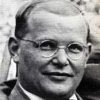Evil is not a political or scientific category. But, after Auschwitz, who could doubt that it exists, and that it manifested itself in the hate-driven genocide carried out by the Nazi regime?
However, noting this fact does not permit us to circumvent our responsibility by blaming everything on a demonic Hitler. The evil manifested in the Nazi ideology was not without its precursors. There was a tradition behind the rise of this brutal ideology and the accompanying loss of moral inhibition.
Above all, it needs to be said that the Nazi ideology was something that people supported at the time and that they took part in putting into effect.
Gerhard "Gerd" Schröder (b. 1944) German politician, Chancellor (1998-2005), lobbyist
Speech, Sixtieth Anniversary of the Liberation of Auschwitz, Berlin (25 Jan 2005)
(Source)
Quotations about:
Nazi
Note not all quotations have been tagged, so Search may find additional quotes on this topic.
It is tempting to say that a Nazi murderer is beyond the pale of understanding. […] Yet to deny a human being his human character is to render ethics impossible. To yield to this temptation, to find other people inhuman, is to take a step toward, not away from, the Nazi position. To find other people incomprehensible is to abandon the search for understanding, and thus to abandon history.
Timothy Snyder (b. 1969) American historian, author
Bloodlands: Europe Between Hitler and Stalin, “Conclusion” (2010)
(Source)
Historians have a word for Germans who joined the Nazi party, not because they hated Jews, but out of a hope for restored patriotism, or a sense of economic anxiety, or a hope to preserve their religious values, or dislike of their opponents, or raw political opportunism, or convenience, or ignorance, or greed.
That word is “Nazi.” Nobody cares about their motives any more.
They joined what they joined. They lent their support and their moral approval. And, in so doing, they bound themselves to everything that came after. Who cares any more what particular knot they used in the binding?
Andrew R. Moxon (contemp.) American writer, critic [a.k.a. Julius Goat]
Blogspot (16 Jan 2017)
(Source)
Frequently mis-attributed to Twitter, where Moxxon also posts under his @JuliusGoat handle. The original Julius Goat Blogspot site is no longer online.
There are three possible ways in which the church can act toward the state: in the first place, as has been said, it can ask the state whether its actions are legitimate and in accordance with its character as state, i.e., it can throw the state back on its responsibilities. Secondly, it can aid the victims of state action. The church has an unconditional obligation to the victims of any ordering society, even if they do not belong to the Christian community. “Do good to all men.” In both these course of action, the church serves the free state in its free way, and at times when laws are changed the church may in no way withdraw itself from these two tasks.
The third possibility is not just to bandage the victims under the wheel, but to put a spoke in the wheel itself. Such action would be direct political action, and is only possible and required when the church sees the state fail in its function of creating law and order, i.e., when it sees the state unrestrainedly bring about too much or too little law and order.
Dietrich Bonhoeffer (1906-1945) German Lutheran pastor, theologian, martyr
“The Church and the Jewish Question” (1933)
(Source)
On the need for Christian clergy to actively oppose the Nazi regime's persecution of Jews.
It was a great relief to be in a country where salacious sex literature cannot be sold; where putrid motion pictures and gangster films cannot be shown. The new Germany has burned great masses of corrupting books and magazines along with its bonfires of Jewish and communistic libraries.





